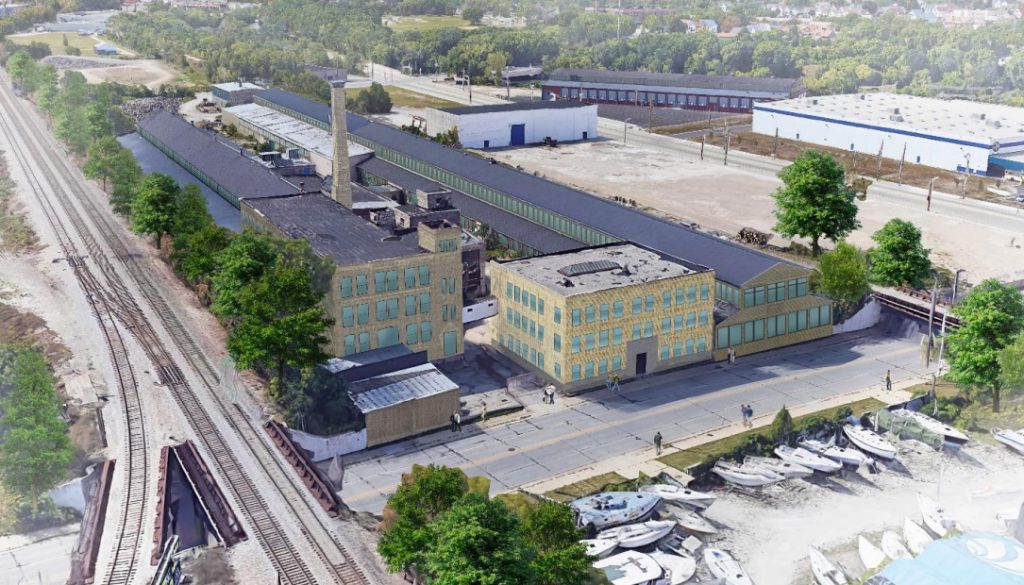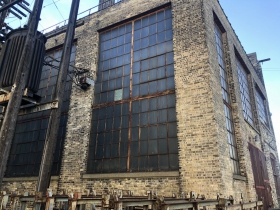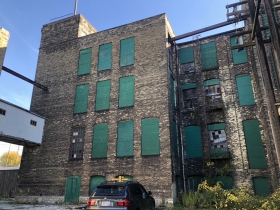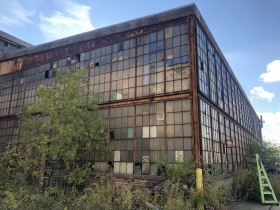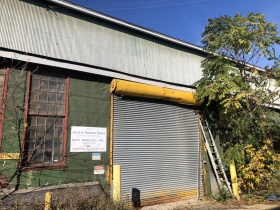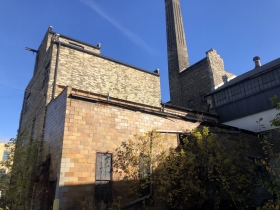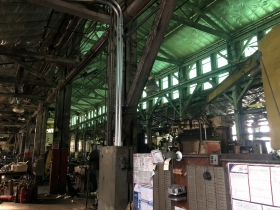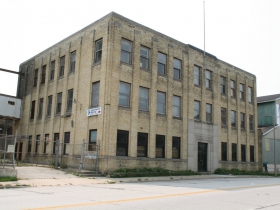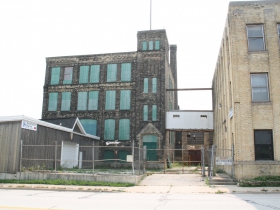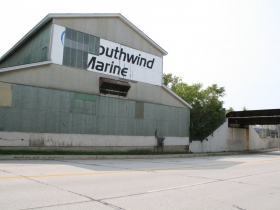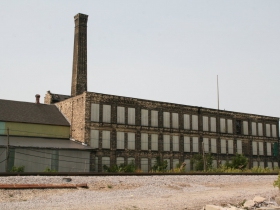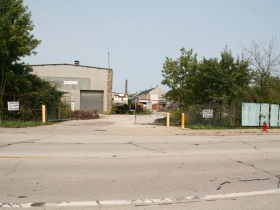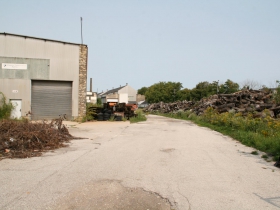Bay View to Get City’s Biggest Private Affordable Housing Project
Biggest in history. Filer & Stowell project plans 210 affordable apartments.
Over two-thirds of the approximately 300 apartments planned for the Filer & Stowell complex at 147 E. Becher St. would be set aside at below-market rates, making this the biggest such project in city history.
Bear Development CEO S.R. Mills provided an update on the project Monday evening during a community meeting. The company, as covered by Urban Milwaukee, offered tours of the 10-acre property and its century-old buildings over the weekend.
The Kenosha-based company would apply for competitively-awarded low-income housing tax credits to finance its proposal. In exchange for the income tax credits, which developers often sell to institutional investors, Bear would be required to set aside specific units at below-market rates for a period of up to 30 years. These units would only be available to those making less than 80% of Milwaukee County’s median income. The state-administered federal program is the most commonly used program in Milwaukee for the creation of affordable housing.
A document presented by Bear calls for 151 one-bedroom units (priced from $471 to $1,258 per month), 101 two-bedroom units ($566-$1,510) and 48 three-bedroom units ($654 to $1,744). All of the three-bedroom units would have direct access as townhomes, while the other units would be in larger apartment buildings created from the historic manufacturing campus. Engberg Anderson Architects has been retained to guide the design process. No new buildings are currently planned.
Mills said the Milwaukee area has a vacancy rate of 5.4% for all apartments, but only 1% for tax-credit supported workforce housing. The program caps rents at 30% of an individual’s or family’s income. A Department of City Development representative said 55% of city renters pay more than 30% of their household income towards rent.
“Really the goal here is to have housing where nobody spends more than 30 [percent] of their income on housing,” said Mills. Depending on the specific credits awarded, a number of rental rates and income thresholds could be set, as low as 30% of the area median income.
The project, if the credits are awarded as expected, would be the largest private affordable housing development in Milwaukee’s history, surpassing a project for which construction is just starting. The Community Within The Corridor, led by Que El-Amin, will create 197 apartments in a former manufacturing campus at N. 32nd St. and W. Center St. Both projects also rely on historic preservation tax credits.
The Community Within the Corridor development is receiving multiple subsidies on account of the environmental contamination on the site and the market challenges of constructing new housing in the Sherman Park neighborhood. The Bay View proposal is surrounded by unsubsidized, newly-constructed market-rate housing, but Mills told the virtual meeting attendees that Bear still plans to seek city assistance through a tax incremental financing (TIF) district.
In recent years the city has supported virtually every new affordable housing development with a developer-financed TIF deal that effectively rebates future property tax payments to offset a financial gap in the project’s financing.
Mills estimated the project would pay $500,000 in property taxes annually. Assessments for rental properties are set on an income-basis under state law, with units rented for below-market rates resulting in lower assessments.
The city could also leverage a TIF deal to extract public concessions from the developer. The south side of the site is currently the terminus for the southern leg of the rails-to-trail Kinnickinnic River Trail. Bear would acquire the adjacent portion of the abandoned railroad corridor and currently plans to use it for parking, but the trail could be extended along the corridor or through another part of the development. Mills said he would welcome those discussions. The city recently secured a grant to construct on-street improvements to link the north and south legs of the trail, but has not advanced construction.
“I don’t want anyone to think there have been any decisions that have been made there yet,” said DCD city planning manager Sam Leichtling.
Any deal greater than $1 million, under city policy, requires the developer to have 40 percent of the project’s work hours completed by unemployed or underemployed city residents and 20 percent of the project’s contracting costs completed by minority-owned or otherwise disadvantaged small businesses.
Before construction of any kind takes place, the property needs to be rezoned. Bear is seeking to have the site rezoned to accommodate residential use of the former industrial buildings. The long, narrow site runs from E. Becher St. to E. Lincoln Ave. with railroad corridors on each side. The company is currently requesting the site be rezoned from “Industrial – Heavy” to “Industrial – Mixed,” a change of use envisioned by the Harbor District Water and Land Use Plan. The site sits on the district’s southern border.
Current plans call for redeveloping the various buildings at the site, many made from Cream City brick and over a century old, with no new construction. A generic rezoning request would permit changes to that plan, while a Detailed Planned Development designation would require specific plans.
The rezoning request requires Common Council approval and public hearings before the City Plan Commission and council. Bear hopes to secure financing and all approvals by the end of 2021 and complete construction in 2023. It plans to complete the whole development in one phase.
“As a neighbor, I would not rather have the construction drawn out, I would rather move through it really quickly,” said Mills.
Two multi-story buildings that front E. Becher St., one with three floors and another with four, look like candidates for redevelopment with historical office uses. Located behind each structure is a long building that Filer & Stowell used for manufacturing sawmill equipment. A corridor splits the two structures with a number of loading bays, a set of disused railroad tracks and a variety of parked vehicles and equipment.
Southwind Marine would continue to operate on the north side of E. Becher St. according to property and business owner Brian Read.
Bear has developed two properties in Milwaukee, both of which involved repurposing existing buildings. It developed a Homewood Suites hotel in the Button Block Building at 500 N. Water St. It also redeveloped a building at 700 W. Michigan St. into the 700 Lofts low-income housing apartment complex. The company has developed a number of projects outside Milwaukee with a variety of uses.
Tour Photos
September Photos
If you think stories like this are important, become a member of Urban Milwaukee and help support real, independent journalism. Plus you get some cool added benefits.
More about the Filer & Stowell redevelopment
- Friday Photos: The Corliss Transforms Bay View, Harbor District Border - Jeramey Jannene - Apr 11th, 2025
- Friday Photos: Demolition Work Begins For Massive Affordable Housing Development - Jeramey Jannene - Feb 16th, 2024
- Eyes on Milwaukee: 576-Unit Bay View Apartment Complex Wins Key Approval - Jeramey Jannene - Sep 12th, 2023
- Eyes on Milwaukee: Construction Could Start in 60 Days On Massive Bay View Project - Jeramey Jannene - Aug 17th, 2023
- Eyes on Milwaukee: Massive Bay View Development Plan Has Grown - Jeramey Jannene - May 24th, 2023
- Eyes on Milwaukee: Deal On Affordable Housing Adds Bay View, Edison School Projects - Jeramey Jannene - Dec 13th, 2022
- Eyes on Milwaukee: 7 Milwaukee Affordable Housing Projects Win Funding - Jeramey Jannene - Nov 4th, 2021
- Eyes on Milwaukee: Harbor District Project Moving Forward - Jeramey Jannene - Oct 25th, 2021
- Transportation: Becher Street Receiving Road Diet, Raised Bike Lane - Jeramey Jannene - Jul 31st, 2021
- Eyes on Milwaukee: 10 City Affordable Housing Projects Win State Financing - Jeramey Jannene - Apr 27th, 2021
Read more about Filer & Stowell redevelopment here
Political Contributions Tracker
Displaying political contributions between people mentioned in this story. Learn more.
Eyes on Milwaukee
-
Church, Cupid Partner On Affordable Housing
 Dec 4th, 2023 by Jeramey Jannene
Dec 4th, 2023 by Jeramey Jannene
-
Downtown Building Sells For Nearly Twice Its Assessed Value
 Nov 12th, 2023 by Jeramey Jannene
Nov 12th, 2023 by Jeramey Jannene
-
Immigration Office Moving To 310W Building
 Oct 25th, 2023 by Jeramey Jannene
Oct 25th, 2023 by Jeramey Jannene


